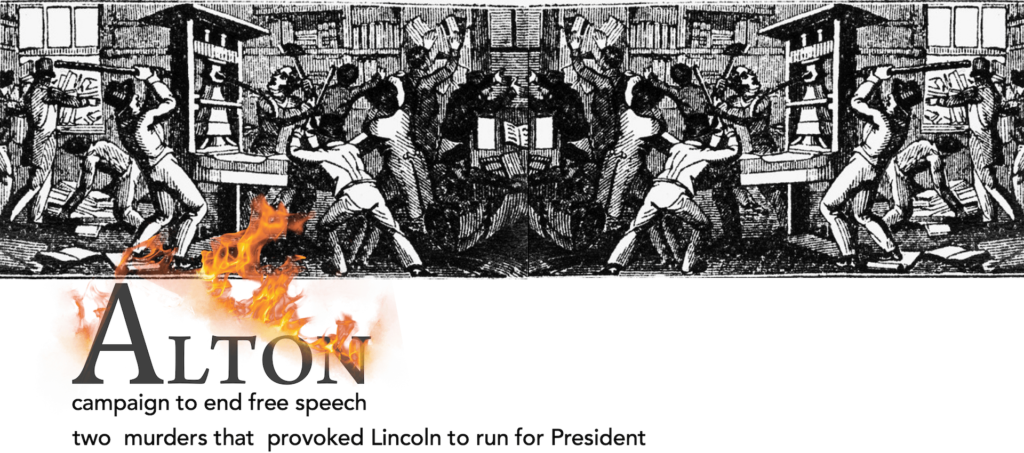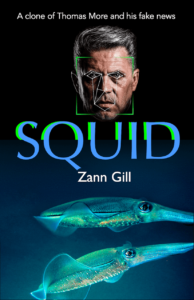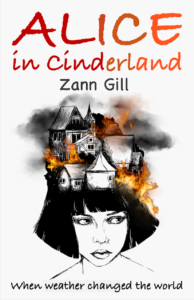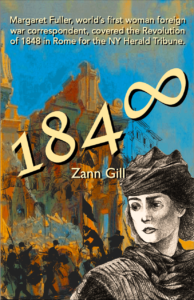

AUDIOBOOK, TALKS, AND PODCAST DISCUSSION TOPICS
In the 7th hearing of the Congressional Investigation on the January 6 Attack on the Capitol, Congressman Jamie Raskin compared the January 6 Attack on the Capitol to the mob attack and murder of Elijah Lovejoy in Alton (1837), and Abraham Lincoln’s warning soon after [14:13 – 15:04].
SAMPLE CHAPTERS narrated by Alan Reinhardt.
Prologue. PIASA, the Overseer
Chapter 26. The Mayor Gives In
Chapter 27. Hangin’ or Lashin’
Chapter 56. Top Hats and Tails
Chapter 57. A Night of Murder
Kai Eckhardt, composer and jazz improv artist on the Faculty at UC Berkeley and sponsored by Cal Performances, has a great musical style for the ALTON audiobook and film soundtrack. Songs from Eckhardt’s existing repertoire evoke scenes in the ALTON audiobook and screenplay.
Listening to Seven Cows Jumping Over the Moon, we can imagine how Horace Speare, prominent Alton, Illinois lawyer, paid off by Missouri slaveholding interests to “get rid of that abolitionist editor Lovejoy,” has rounded up a gang of thugs to tar and feather Lovejoy, strap him into a canoe, and float him down the Mississippi River. Elijah Lovejoy has left his house to get medicine for his feverish wife. Fearing violence in the streets of Alton at night, he takes the long route home through the forest. Unwittingly, he walks straight into the lair of Speare and his lowlife gang stirring hot tar.
Eckhardt’s song Weapons of Mass Destruction could play behind the film credits and evokes the flash forward at end of the audiobook / film to show how the violent racism of the 1830s continues today. Eckhardt and his band, Garaj Mahal, are embedded in the Oakland – SF gospel artist community and can identify outstanding gospel talent for the Alton soundtrack.
Abraham Lincoln’s first great speech of January 27, 1838 after the Alton scandal not only launched his trajectory toward the Senate and Presidency twenty years later. It’s also eerily relevant again today as we see
- striking parallels between ALTON, set the 1830s, and today;
- democracy threatened, both then and now;
- free speech and freedom of the press threatened, both then and now;
- mob burnings then echoed in mass murders and the January 6th, 2021 Assault on the Capitol.
Excerpt from Abraham Lincoln’s prophetic warning, read by Alan Reinhardt,
Questions for Podcasts:
- What do you see as the urgent message of ALTON for today?
- What was your biggest surprise in writing the book ALTON?
- ALTON is a tragic story. How was writing this story uplifting for you?
- How do you, and your invited chapter authors, believe that ALTON can empower change-makers for equity?

Historical fiction is a powerful lens: “Those who fail to learn from history are doomed to repeat it” (Churchill and Santayana). My father John Glanville Gill did the original research on Elijah Parish Lovejoy for his Harvard Ph.D. thesis, which became a book. I first wrote ALTON as a screenplay to fulfill his dream of having his book produced as a movie. To tighten the plot and reduce the number of characters, my screenplay and book are historical fiction, though with extensive references.
Questions:
1. How does ALTON enable us to look at the present through another lens?
2. How do you see coupling your father’s factual account with your historical fiction story as more powerful to convey the message than either could be alone?
3. How is historical fiction like designing a puzzle to highlight issues and convey a sense of the times?
4. How would you, and your invited chapter authors, ideally like for these discussion sessions to spark next steps that have impact?
More on Zann Gill. Press release. For reviewer copies of the book, see press release and contact Alex Young-Davis.




